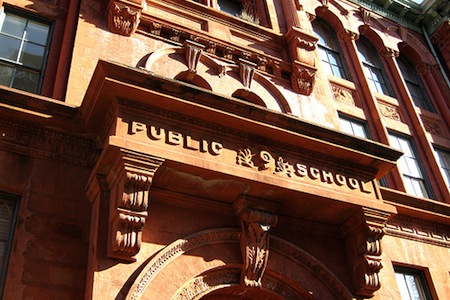How to Revitalize Public Education

P.S. 9 in Brooklyn, New York. Credit: Flickr/calculat0r.
I have a very different vision of what public schools should be doing than Bill Gates, Michelle Rhee, Jeb Bush, Arne Duncan, Michael Bloomberg and the current generation of “school reformers.” My vision involves making schools centers of community revitalization where young people's curiosity and creativity are nurtured, where student differences are recognized and respected, where the physical and emotional health of children is promoted, where teachers have long careers, and where parents and community members are welcome.
Here is my vision: begin with creating a child-friendly environment. That means sharply reducing the number of tests, which wil leave ample room for exercise and play, the arts, and hands-on learning and projet-based activity. Ideally, I would also like to see as many schools as possible grow and prepare food (with indoor and outdoor farms) and link that to science instruction. Students should also participate in community improvement initiatives, receive laptop computers they can take with around with them, and become involved in mentoring younger students. As much as possible, I would like learning to be cooperative rather than competitive experience, and extend that ethos to the teaching staff -- a process that would mean removing the threat of school closings and an end to student test score-driven evaluation done by consultants. Instead, evaluation ought to be done by teaching peers using multiple measures.
I would also like to see an end to the “one path fits all” approach to secondary education and revive the vocational and technical schools once a fixture in our educational system to prepare students for decent paying jobs in traditional trades such as auto and appliance repair, as well as emerging areas like solar and wind energy and sustainable agriculture. Germany and other Northern European countries offer a model going forward.
Additionally, I would try to create a climate where talented people enter teaching as a lifetime career, which means treating teachers with respect, giving them input into all decisions affecting their professional lives -- including at those made at the city, state and national level -- and an end to political attacks on their collective bargaining rights.
And in communities which suffer the effects of poverty, I would turn schools into 24-hour community centers which serve neighborhood residents as well as students, and train residents of those communities to run programs in the schools, whether they be after-school sports, arts and computer programs, school-based farms or community improvement initiatives. I would also actively recruit the teaching staff for those schools from people who live in those communities, or communities like them and incorporate the culture and history of the people in those neighborhoods into school curricula.
Right now, the basic thrust of "education reform" is making teachers hate teaching, students dread going to school, and parents fear that the love of learning in their children will be snuffed out by excessive testing.
We can do better, but only if our basic goal is to make schools places where young people are inspired and nurtured, and where teaching is treated as a lifetime calling that allows talented people the opportunity to work collaboratively and creatively.
